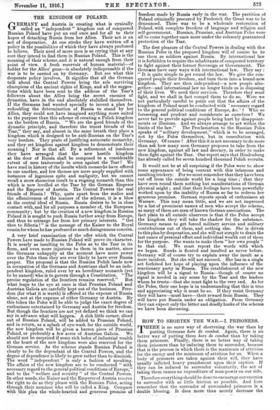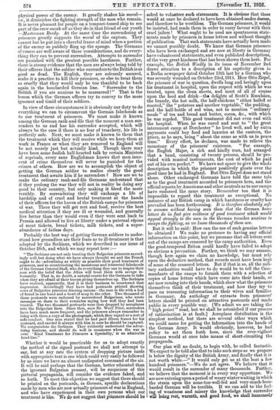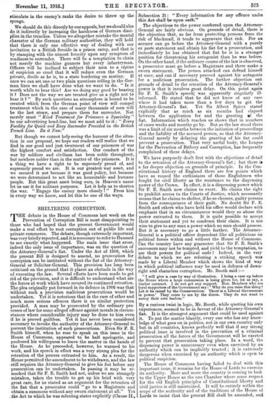HOW TO SHORTEN THE WAR.—I. PRISONERS. T HERE is no surer
way of shortening the war than by putting Germans hors de combat. Again, there is no better way of putting them hors de combat than by taking them prisoners. Finally, there is no better way of taking them prisoners than by inducing them to surrender, because that is the process in which there is the maximum of attrition for the enemy and the minimum of attrition for us. When a body of prisoners are taken against their will, they have usually inflicted heavy punishment upon their captors. Jf they can be induced to surrender voluntarily, the act of taking them causes no expenditure of man-power on our side.
Therefore everything should be done to encourage our enemies to surrender with as little friction as possible. And here remember that the surrender of unwounded prisoners is a double blessing. It does • more • than merely decrease the physical power of the enemy. It greatly shakes his moral- i.e., it diminishes the fighting strength of the men who remain. It is never pleasant for people on a tempest-tossed .ship to see part of the crew sneak off as they do in that friend of our youth --Masterman Ready. At the same time the surrendering of prisoners greatly supports the moral of the captors. They cannot but be put into a cheerful frame of mind when a portion of the enemy so publicly fling up the sponge. The Germans of course are well aware of these considerations, and do every- thing they can to prevent surrenders. Attempts to surrender are punished with the greatest possible harshness. Further, there is strong evidence that the men are always being told by their officers that the soldier who surrenders to the British is as good as dead. The English, they are solemnly assured, make it a practice to kill their prisoners, or else to treat them so cruelly that they would only be too thankful to be back again in the bombarded German line. "Surrender to the British if you are anxious to be massacred ! " That is the lesson which the German officers try to convey to the more ignorant and timid of their soldiers.
In view of these circumstances it is obviously our duty to do everything we can to circumvent the German falsehoods as to our treatment of prisoners. We must make it known among the German rani-and-file that the moment a man sur- renders to us and has his surrender accepted, which will always be the case if there is no fear of treachery, his life is perfectly safe. Next, we must make it known to them that the treatment which they will receive while we keep them at work in France or when they are removed to England will be not merely just but actually kind. Though there may have been some foolish half-hearted talk by certain Ministers of reprisals, every sane Englishman knows that men inno- cent of crime themselves will never be punished for the crimes of others. How are we to accomplish the object of getting the German soldier to realize clearly the good treatment that awaits him if he surrenders ? How are we to make the ordinary rank-and-file Germans understand that if they prolong the war they will not in reality be doing any good to their country, but only making it bleed the more terribly. By surrendering they will exchange a life of hardship and of cruel and brutal treatment at the hands of their officers for the haven of the British camps for prisoners of war. There they will get rest and food, receive the best medical attention if they are ill or wounded, and generally live better than they would even if they were sent back to Prussia and allowed to live at liberty under a paternal regime of meat tickets, bread tickets, milk tickets, and a super- abundance of fatless days.
Probably the best way of getting German soldiers to under- stand how groundless are their fears as to ill-treatment is that adopted by the Serbians, which we described in our issue of October 28th, and which we may repeat here :— " The Serbians are not only treating their Bulgarian prisoners exceed- ingly well, but doing what we have always thought we and the French ought to do—advertising as widely as possible their good treatment of prisoners, and so counteracting the monstrous and interested falsehoods of the German General Staff, who do everything they can to inspire their men with the belief that the Allies will treat them with savage in- humanity. That is, no doubt, a natural course for the Germans to take when they are afraid of their troops giving themselves up. The Serbians have realized, apparently, that it is their business to counteract that impression. Accordingly they have had postcards printed showing rows of Bulgarian prisoners drawing rations—the men in file with a loaf of bread in one hand and a bowl of soup in the other. Two thousand of these postcards were endorsed by surrendered Bulgarians, who wrote messages on them to their comrades saying how well they had been treated. The two thousand postcards were then dropped by aeroplanes into the Bulgarian lines. Since then, says Mr. Ward Price, surrenders have been much more frequent, and the prisoners always remember to bring with them a copy-of the photograph,whieh they regard as a sort of safe-conduct. One man stated that he had paid fifteen francs for his postcard, and-carried it alvrays with him in ease he should be captured. We congratulate the Serbians. They evidently understand the adver- tising business, and should do well in commerce when the war is over. Kind Treatment for Prisoners a Speciality,' is an admirable head-line."
Whether it would be practicable for us to adopt exactly the method of the signed postcard we shall not attempt to say, but at any rate the system of dropping picture cards with appropriate text is one which could very easily be followed by us since we have an almost undisputed command of the air. It will be said perhaps that the German, better educated than the ignorant Bulgarian peasant, will be suspicious of this pictorial propaganda, will consider the evidence faked, and so forth. To meet this objection we suggest that there should be printed on the postcards, in German, specific declarations made by men who are now actually prisoners of war in England, and who have experienced in their own persons what our treatment is like. We de not suggest that_priseners should be asked to volunteer such statements. It is obvious that these would at once be declared to have been obtained under duress, and therefore to be worthless. The German prisoners, it would • be insisted, had made them in order to curry favour with their cruel jailers ! What ought to be used are spontaneous state- ments made by prisoners in home letters and without thought of publication. That such statements have actually been made we cannot possibly doubt. We know that German prisoners who have been exchanged and are now at liberty in Germany have volunteered statements, and even published descriptions, of the very great kindness that has been shown them here. For • example, the British Wee/4i in its issue of November 2nd draws attention to a description of his captivity given in a Berlin newspaper dated October 13th last by a German who was severely wounded on October 23rd,1914. Herr Otto Zirpel, • the prisoner of war in question, dwells long and lovingly upon his treatment in hospital, upon the respect with which he was treated, upon the clean sheets, and most of all of course upon the food and drink—the delights of Scott's Emulsion, the brandy, the hot milk, the half-chickens" either boiled or roasted," the "potatoes and another vegetable," the pudding, and the half-bottle of red wine, not to mention ordinary meals" of tea and bread and butter, cocoa, &c., with which he was regaled. This good treatment did not even end with the hospital. When he was cured and sent to "the great internment camp at Dorchester" he lived well, and by extra payments could buy food and luxuries at the canteen, the prices, as he says, being "about the same as with us in peace time." Every effort, he declares, was made to relieve the monotony of the prisoners' existence. "For example, the English Major, a rich and kindly man, had arranged that a band, consisting of twenty persons, should be • pro- vided with musical instruments, the cost of which he paid out of his own pocket." We have not space to give the whole description in which the prisoner positively gloats over the good time he had in England. But Otto Zirpel does not stand alone. Other exchanged Germans have told the same tale as to the good treatment accorded to prisoners here, and the official reports by Americans and other neutrals as to our camps have endorsed the same story. Remember too that it is impossible to regard this treatment as exceptional. No instance of any British camp in which harshness or cruelty has prevailed has been forthcoming. It is therefore absolutely safe to assume without having seen them that the German home letters do in fact give evidence of good treatment which would appeal strongly to the men in the German trenches anxious to escape the fighting, as we know thousands of them are.
But it will be said: How can the use of such genuine letters be obtained ? We make no pretence to having any official information on this point, but we presume that all letters sent out of the camps are censored by the camp authorities. Even the good-tempered Briton could hardly have failed to adopt so obvious a precaution. Further, we think we may assume, though here again we claim no knowledge, but must rely upon the deductive method, that records must have been kept of some of the censored letters. But if that is so, all the mili- tary authorities would have to do would be to tell the Com- mandants of the camps to furnish them with a selection of copies of home letters which have come into their hands, or are now coming into their hands, which show what the prisoners themselves think of their treatment, and how they try to pass on reassuring information to their wives and families in Germany. An anthology of extracts from prisoners' letters should be printed on attractive postcards and made public in every possible way. [We admit we are taking the " high priori road, but we shall be astonished if our process of ratiocination is at fault.] Aeroplane distribution is the simplest method, but there are several other ways which we could name for getting the information into the hands of the German Army. It would obviously, however, be bad policy to set them forth here, since the ever-vigilant Germans would at once take means of short-circuiting the propaganda.
Our plan will no doubt, to begin with, be called fantastic. We expect to be told also that to take such steps as we propose is below the dignity of the British Army, and finally that it is not worth while.— It would only get us at the best a few hundred prisoners."—We do not agree. We believe that it would result in the surrender of many thousands. Further, we believe that the moment is in every way opportune. We are now entering upon a period of weary winter waitim in which the strain upon the none-too-well-fed and very-much-bom- barded German will be terrible. If we can add to the feel- in f weariness and misery the knowledge that surrender Al bring rest, warmth, and good food, we shall immensely stimulate in. the enemy's..ranks the desire to throw up the sponge.
We should do this directly by ourala, but washould also do it indirectly by increasing the harshness of German disci- pline in the trenches. Unless we altogether mistake the mental character of the German military authorities, they will hold that there is only one effective way of dealing with our invitation to a British fireside in a prison camp, and that is by stamping with the utmost ferocity upon any symptom of readiness to surrender. There will be a temptation to chain not merely the machine gunners but every infantryman. Officers will be inclined to subject their men to a regime of suspicion so cruel that it will reduce even the German private, docile as he is, to a state bordering on mutiny. If once we can set one.or two plain questions rolling in the Ger- man lines we shall have done what we want to do. "Is it worth while to bear this? Are we doing any good by bearing It? Does not the way we are treated give us a right not to bear it ? " By such questions an atmosphere is bound to be created which from the German point of view will compel treatment which in the case of many thousands of men will be the last straw, and prepare them for surrender. Not merely must "Kind Treatment for Prisoners a Speciality" be our advertising head-line, but we must add to it : "Every Facility for Quick and Easy Surrender Provided in the British Trench Line. Do it Now."
But though we cannot help seeing the humour of the situa- tion in our proposal, we hope our readers will realize that we find in our good and just treatment of our prisoners of war the highest comfort and satisfaction. Our conduct of the war by soldiers and civilians has been noble throughout, but nowhere nobler than in the matter of the prisoners. It is a thing we have a right to be supremely proud of, and supremely proud we are. It is our greatest war asset, and we secured it not because it was good policy, but because we were determined, to act like an honourable and humane people. But this great asset being ours, in Heaven's name let us use it for militant purposes. Let it help us to shorten the war. "Engage the enemy more closely 1" Press him in every way we know, and let this be one of the ways.




































 Previous page
Previous page